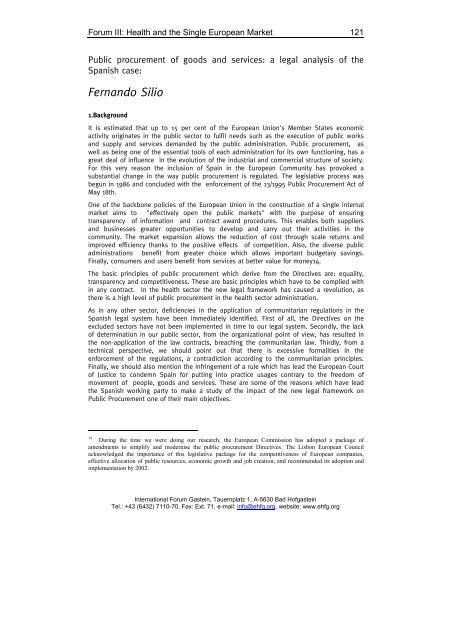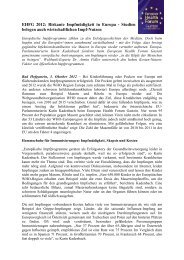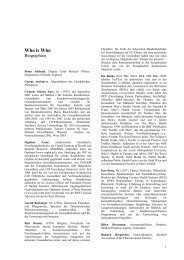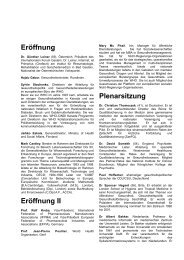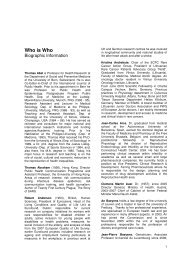Congress report - European Health Forum Gastein
Congress report - European Health Forum Gastein
Congress report - European Health Forum Gastein
You also want an ePaper? Increase the reach of your titles
YUMPU automatically turns print PDFs into web optimized ePapers that Google loves.
<strong>Forum</strong> III: <strong>Health</strong> and the Single <strong>European</strong> Market<br />
International <strong>Forum</strong> <strong>Gastein</strong>, Tauernplatz 1, A-5630 Bad Hofgastein<br />
Tel.: +43 (6432) 7110-70, Fax: Ext. 71, e-mail: info@ehfg.org, website: www.ehfg.org<br />
121<br />
Public procurement of goods and services: a legal analysis of the<br />
Spanish case:<br />
Fernando Silio<br />
1.Background<br />
It is estimated that up to 15 per cent of the <strong>European</strong> Union's Member States economic<br />
activity originates in the public sector to fulfil needs such as the execution of public works<br />
and supply and services demanded by the public administration. Public procurement, as<br />
well as being one of the essential tools of each administration for its own functioning, has a<br />
great deal of influence in the evolution of the industrial and commercial structure of society.<br />
For this very reason the inclusion of Spain in the <strong>European</strong> Community has provoked a<br />
substantial change in the way public procurement is regulated. The legislative process was<br />
begun in 1986 and concluded with the enforcement of the 13/1995 Public Procurement Act of<br />
May 18th.<br />
One of the backbone policies of the <strong>European</strong> Union in the construction of a single internal<br />
market aims to "effectively open the public markets" with the purpose of ensuring<br />
transparency of information and contract award procedures. This enables both suppliers<br />
and businesses greater opportunities to develop and carry out their activities in the<br />
community. The market expansion allows the reduction of cost through scale returns and<br />
improved efficiency thanks to the positive effects of competition. Also, the diverse public<br />
administrations benefit from greater choice which allows important budgetary savings.<br />
Finally, consumers and users benefit from services at better value for money14.<br />
The basic principles of public procurement which derive from the Directives are: equality,<br />
transparency and competitiveness. These are basic principles which have to be complied with<br />
in any contract. In the health sector the new legal framework has caused a revolution, as<br />
there is a high level of public procurement in the health sector administration.<br />
As in any other sector, deficiencies in the application of communitarian regulations in the<br />
Spanish legal system have been immediately identified. First of all, the Directives on the<br />
excluded sectors have not been implemented in time to our legal system. Secondly, the lack<br />
of determination in our public sector, from the organizational point of view, has resulted in<br />
the non-application of the law contracts, breaching the communitarian law. Thirdly, from a<br />
technical perspective, we should point out that there is excessive formalities in the<br />
enforcement of the regulations, a contradiction according to the communitarian principles.<br />
Finally, we should also mention the infringement of a rule which has lead the <strong>European</strong> Court<br />
of Justice to condemn Spain for putting into practice usages contrary to the freedom of<br />
movement of people, goods and services. These are some of the reasons which have lead<br />
the Spanish working party to make a study of the impact of the new legal framework on<br />
Public Procurement one of their main objectives.<br />
14 During the time we were doing our research, the <strong>European</strong> Commission has adopted a package of<br />
amendments to simplify and modernise the public procurement Directives. The Lisbon <strong>European</strong> Council<br />
acknowledged the importance of this legislative package for the competitiveness of <strong>European</strong> companies,<br />
effective allocation of public resources, economic growth and job creation, and recommended its adoption and<br />
implementation by 2002.


